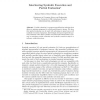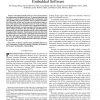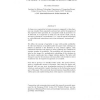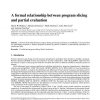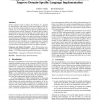154
click to vote
FMCO
2009
Springer
14 years 12 months ago
2009
Springer
Partial evaluation is a program specialization technique that allows to optimize programs for which partial input is known. We show that partial evaluation can be used with advanta...
133
click to vote
TCAD
2002
15 years 1 months ago
2002
The objective of this work is to create a framework for the optimization of embedded software. We present algorithms and a tool flow to reduce the computational effort of programs,...
148
click to vote
CORR
2002
Springer
15 years 1 months ago
2002
Springer
The so called "cogen approach" to program specialisation, writing a compiler generator instead of a specialiser, has been used with considerable success in partial evalu...
135
click to vote
CORR
2002
Springer
15 years 1 months ago
2002
Springer
Program specialisation aims at improving the overall performance of programs by performing source to source transformations. A common approach within functional and logic programm...
169
Voted
CORR
2004
Springer
15 years 1 months ago
2004
Springer
Many functional logic languages are based on narrowing, a unification-based goal-solving mechanism which subsumes the reduction mechanism of functional languages and the resolutio...
138
click to vote
ENTCS
2007
15 years 2 months ago
2007
Poly-controlled partial evaluation (PCPE) is a flexible approach for specializing logic programs, which has been recently proposed. It takes into account repertoires of global co...
131
click to vote
JLP
2006
15 years 2 months ago
2006
As long as no cooperation between processes is supposed to take place, one may consider them separately and need not ask for the progress of the respective other processes. If a c...
126
click to vote
FAC
2006
15 years 2 months ago
2006
A formal relationship between program slicing and partial evaluation is established. It is proved that for terminating programs, a residual program produced by partial evaluation i...
139
click to vote
ENTCS
2008
15 years 2 months ago
2008
We present Oracle-Based Partial Evaluation (OBPE), a novel approach to on-line Partial Evaluation (PE) which decides the control strategy to use for each call pattern by using an ...
138
click to vote
ICFP
2010
ACM
15 years 3 months ago
2010
ACM
Partial evaluation aims to improve the efficiency of a program by specialising it with respect to some known inputs. In this paper, we show that partial evaluation can be an effec...
